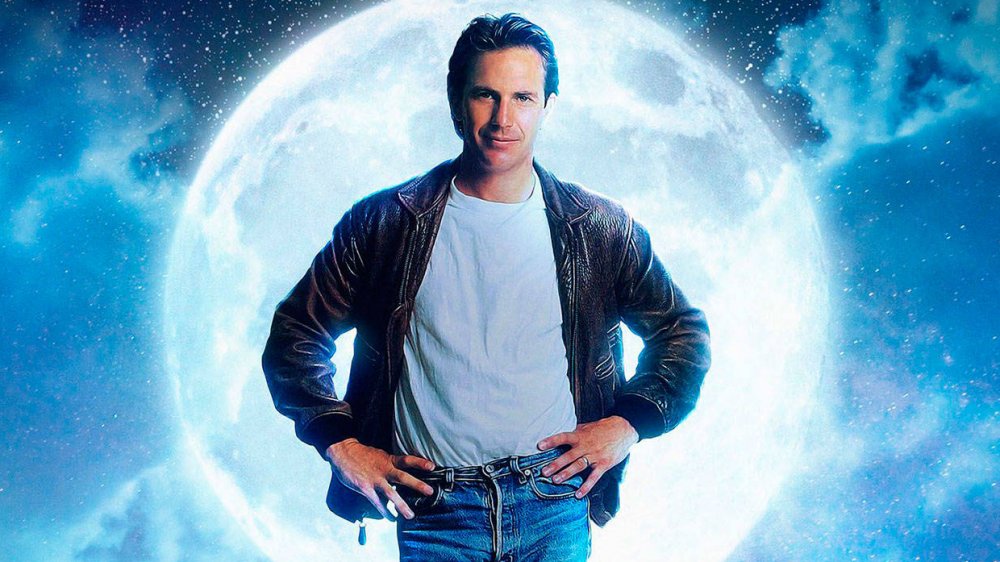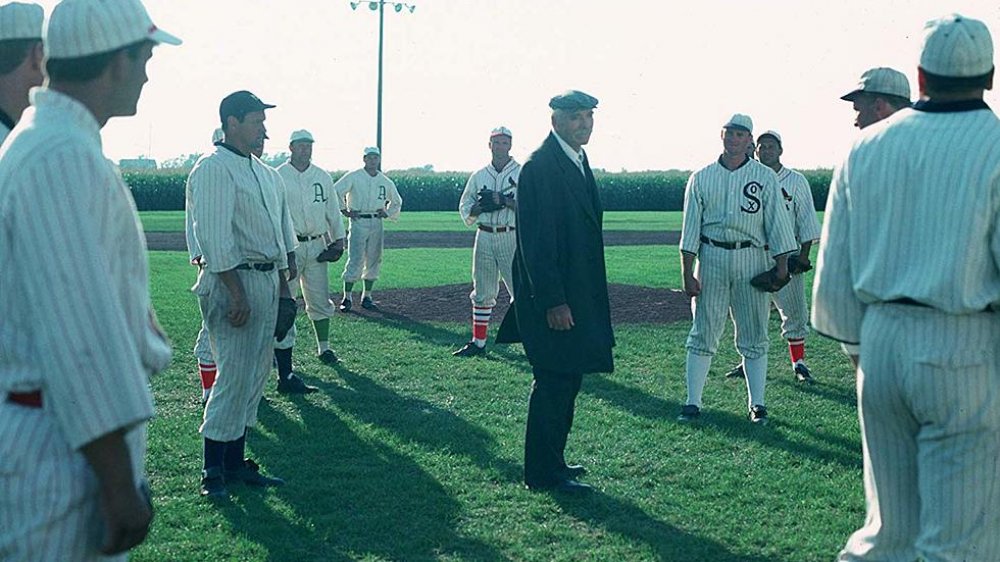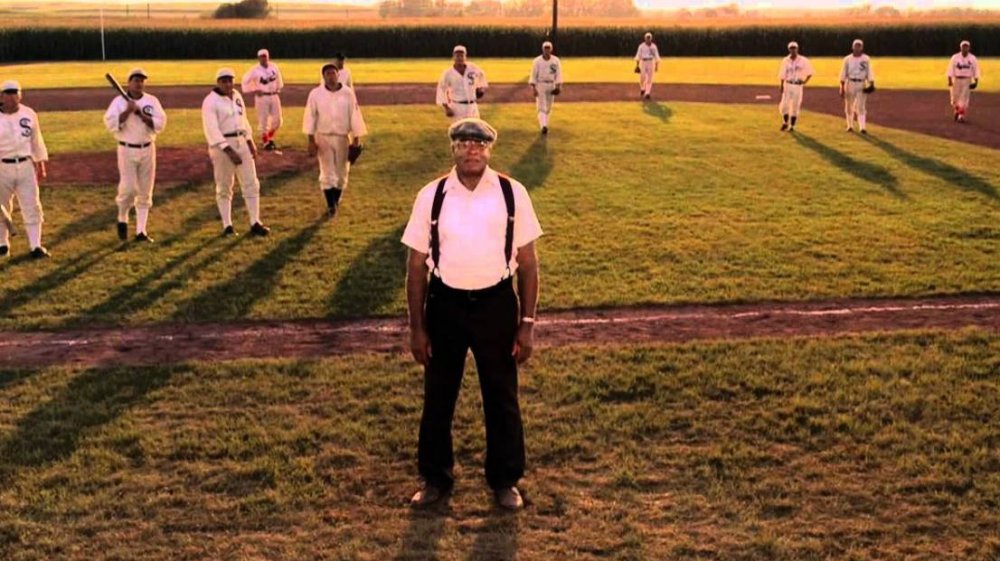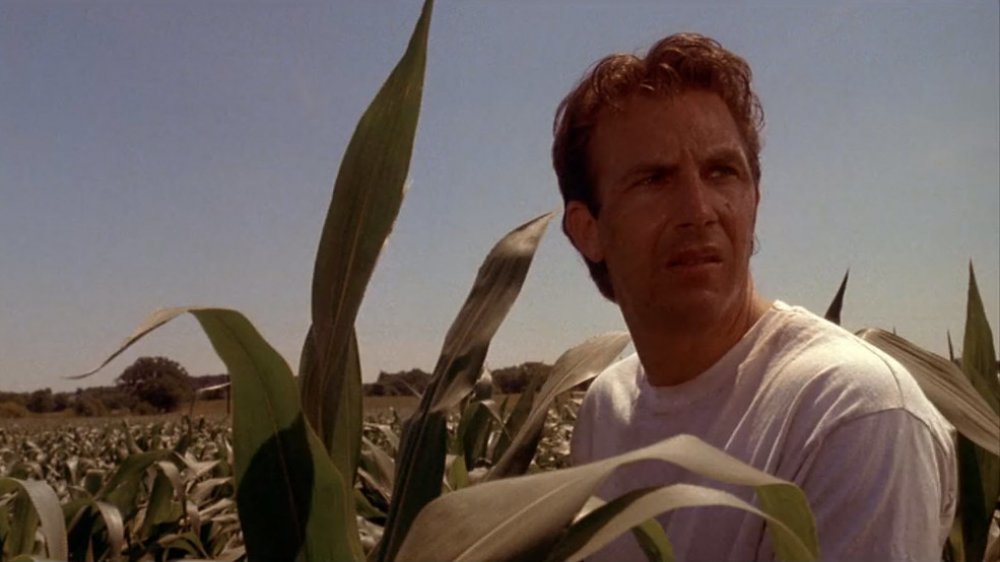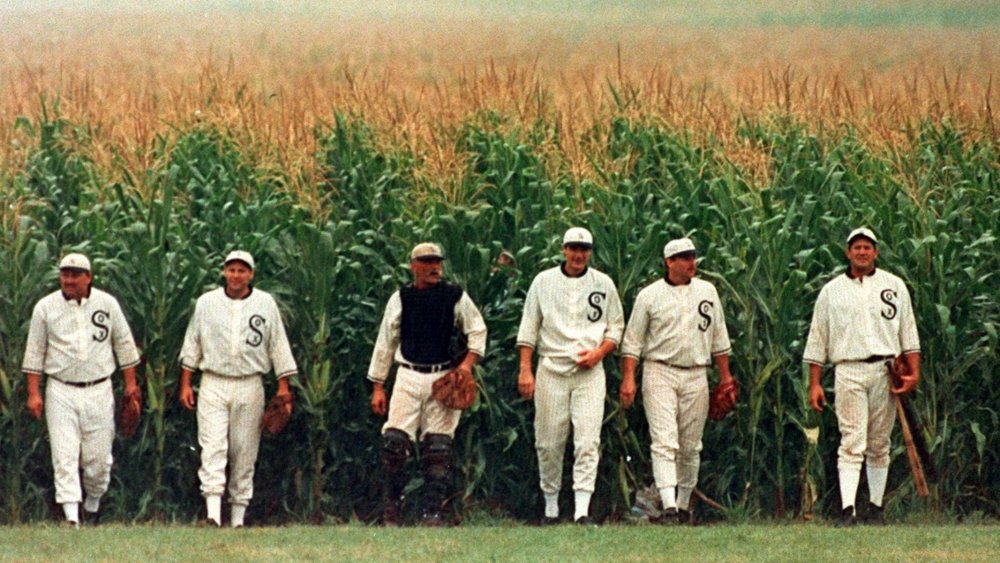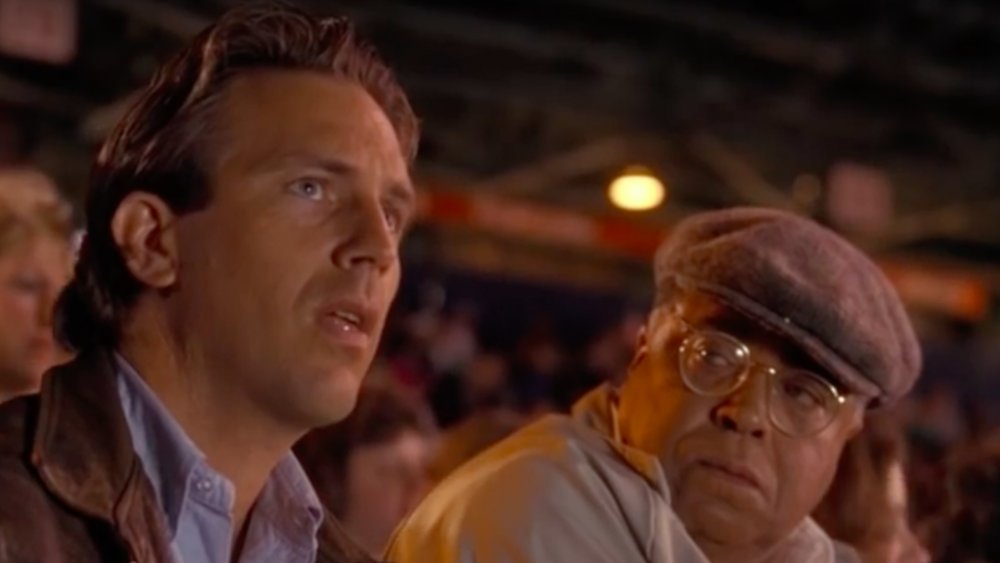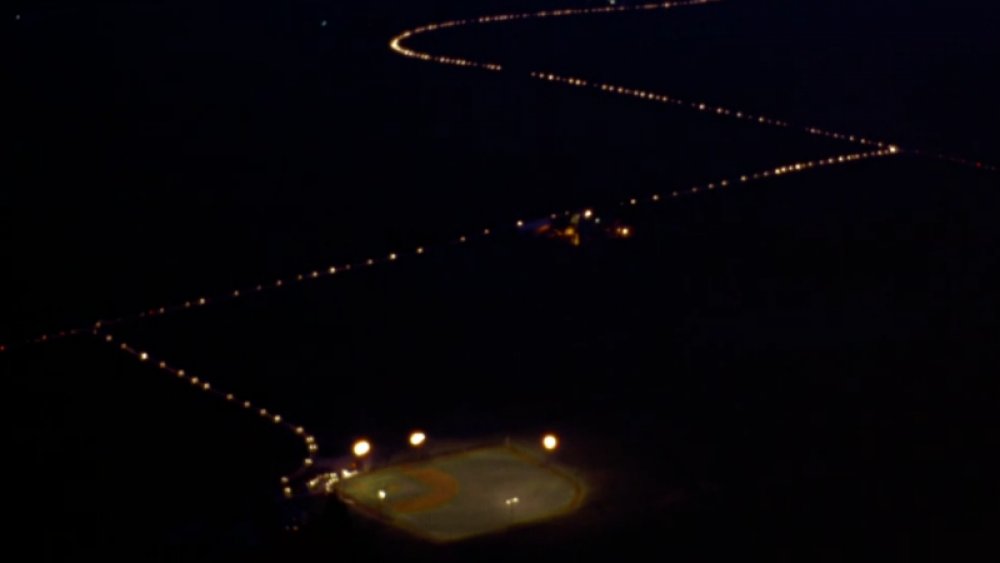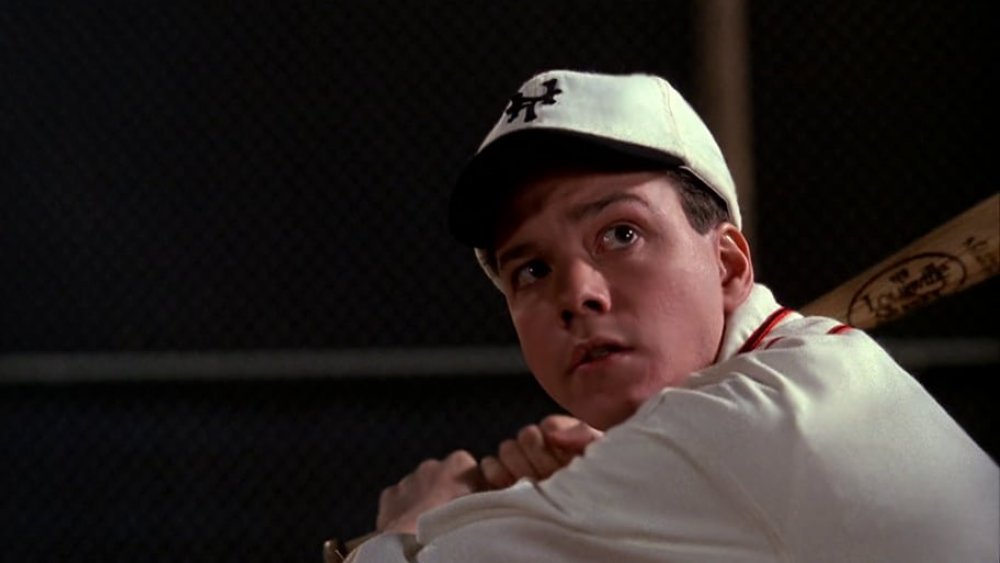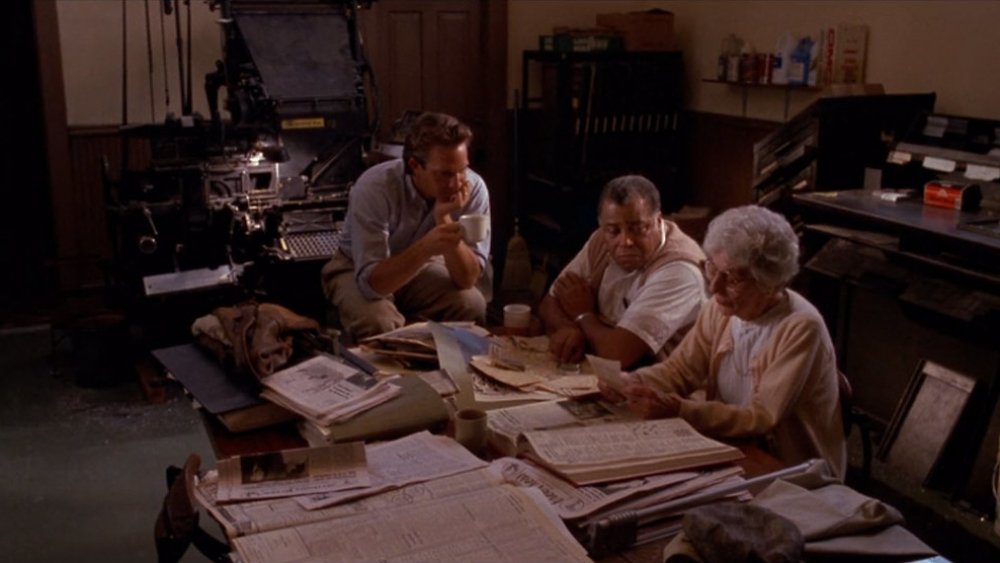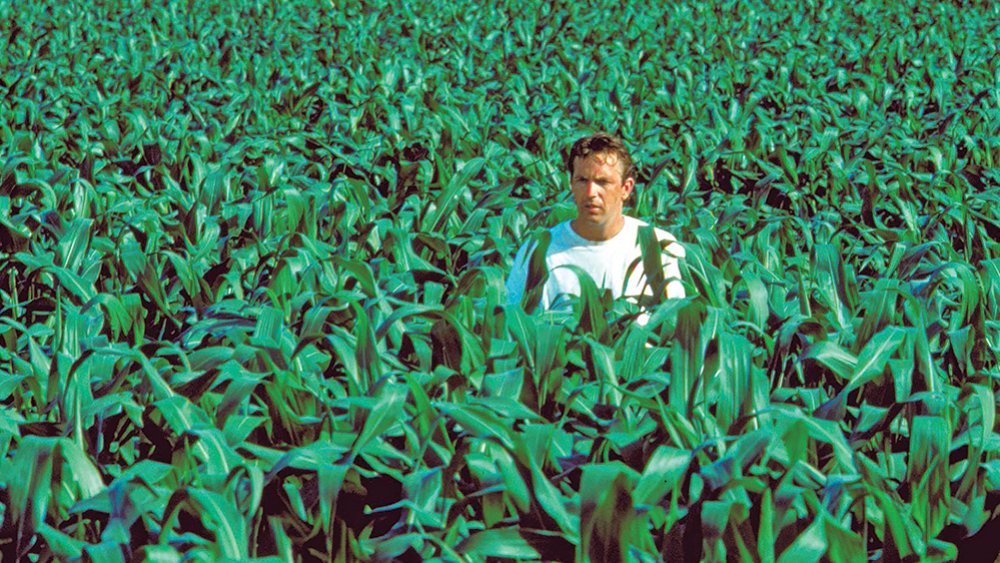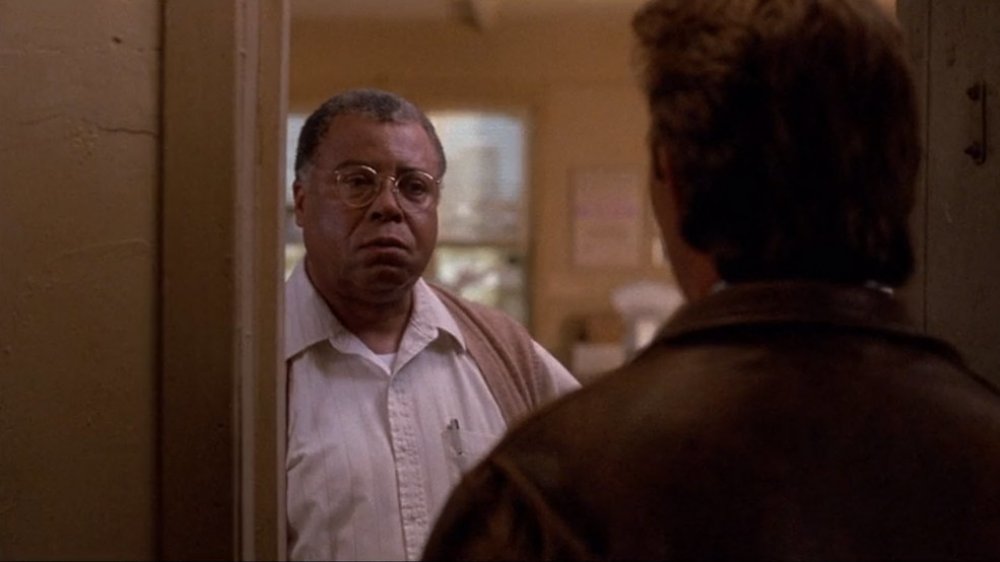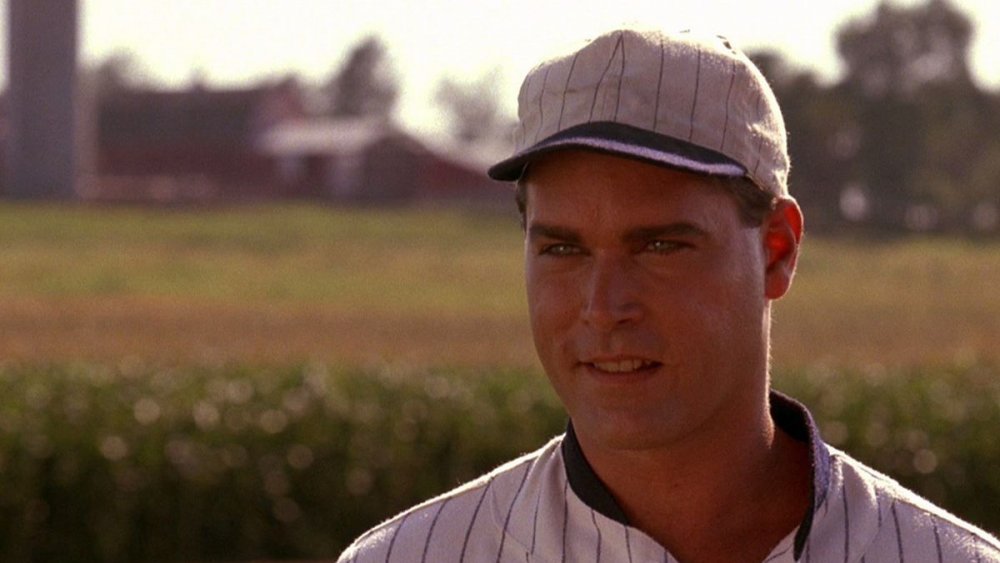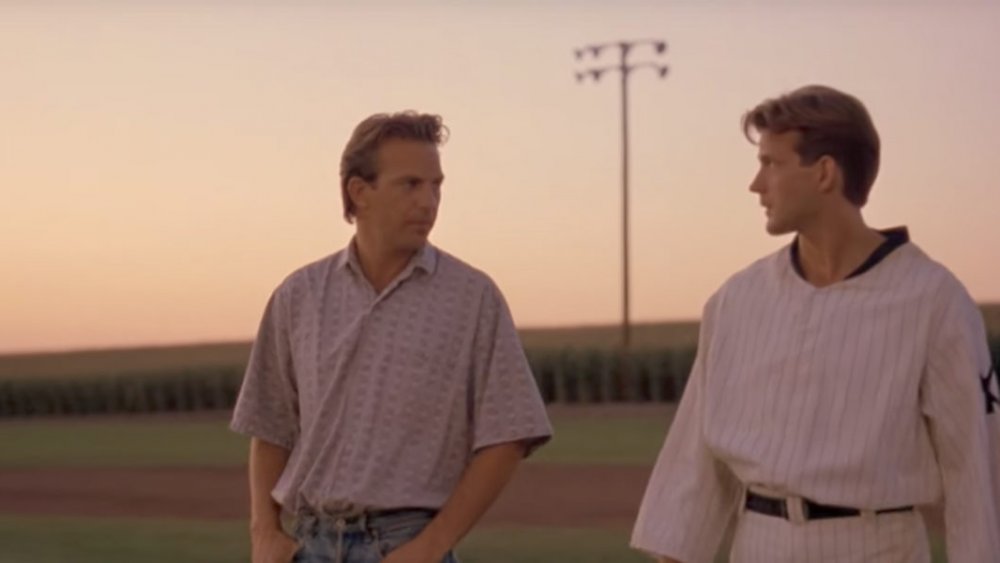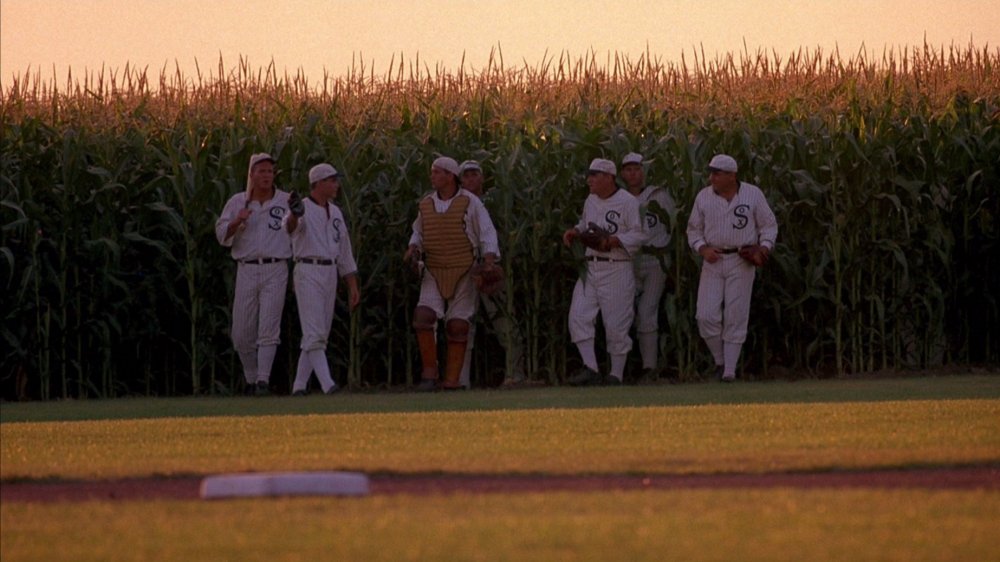The Untold Truth Of Field Of Dreams
Aging hippies Ray Kinsella (Kevin Costner) and his wife Annie (Amy Madigan) move from Berkeley to a farm in Iowa's heartland in writer-director Phil Alden Robinson's classic slice of Americana Field of Dreams. Haunted by his estranged relationship with the father with whom he never reconciled, Ray begins hearing a voice telling him, "If you build it, he will come." Ray has a vision of a baseball field and plows under his corn to construct it, setting himself and his family on a journey of magical realism into the history of baseball, America's pastime. This cross-country journey includes ghosts of the sport long passed like disgraced member of the "Black Sox" Shoeless Joe Jackson (Ray Liotta), reclusive writer Terence Mann (James Earl Jones), and ballplayer Archie "Moonlight" Graham (Burt Lancaster, Frank Whaley) whose stories profoundly intertwine with Ray's.
Decades after its 1989 release, Field of Dreams was one of the 25 films inducted into the National Film Registry in 2017 due to "its importance to American cinema and the nation's cultural and historical heritage," as well as landing the sixth spot on the American Film Institute's Top 10 Best Fantasy Movies list. This is one movie that hasn't given up the ghost in all this time, remaining such a favorite that hundreds of thousands of people go the distance each year to the preserved baseball diamond in Iowa where it was filmed. Is this heaven? No. It's the untold truth of Field of Dreams.
The could-have-beens
By now, Field of Dreams is such a beloved movie that it's hard to imagine how key aspects of the production almost went in completely different directions. Based on W.P. Kinsella's novel Shoeless Joe, the film was supposed to have the same title until test audiences reacted unfavorably, assuming it was a movie about a homeless man rather than one of the most infamous names in major league baseball. Field of Dreams was actually similar to W.P. Kinsella's working title, Dream Field, which publishers scrapped.
Tom Hanks was first approached to play Ray Kinsella, but he turned the role down. Producers didn't think Costner would want to do another baseball movie so soon after Bull Durham, but after reading the script, he signed on.
Costner wasn't the only second choice for a main actor. Originally director Phil Alden Robinson wanted James Stewart to play Doc "Moonlight" Graham, but he passed. Burt Lancaster was cast instead, and while Field of Dreams was Lancaster's last movie before retiring, the movie also features a nod to Stewart with a clip of his classic Harvey.
Finally, Robinson wanted composer Leonard Bernstein for the score, but Bernstein was overbooked. James Horner was his second choice, and reportedly cried during his first viewing of the Field of Dreams rough cut. Horner's deep connection to the story is evident in every bar of the movie's touching score.
People will come, Ray
While a Field of Dreams starring Tom Hanks and Jimmy Stewart and scored by Leonard Bernstein would likely have been a classic in its own right, it's almost impossible to picture the film without James Earl Jones' nuanced performance as reclusive author Terence Mann. In the story, Mann was a radical and revolutionary novelist from the Civil Rights era who coined the phrase "make love, not war" and whose pain Ray Kinsella is supposed to ease by taking him to a baseball game at Fenway Park. While first kidnapped by Ray all the while pretending to hate baseball, Mann eventually reveals his deep connection to the sport.
But Jones wasn't sold on the film. It took his wife's prodding to get him to accept the role, although she was convinced his concluding monologue wouldn't make the final cut. "America has rolled by like an army of steamrollers," Mann assures Kinsella. "But baseball has marked the time. This field, this game, is a part of our past, Ray. It reminds us of all that once was good, and that could be again. Oh people will come, Ray. People will most definitely come." One of the film's most memorable moments, it simply couldn't have existed without this particular actor embodying the role.
Years later, sports commentator Vin Scully would recreate these beautiful words, but nothing compares to James Earl Jones' version.
A deleted scene tested the film's magic too much
When putting a story of magical realism to screen there is a fine balance the production needs in order to maintain both sides of the magical events as well as the realistic context of the story. When Ray first hears the voice saying "If you build it, he will come," he doubts his sanity, but also knows he heard what he heard. When he talks to his wife Annie about it, she's also doubtful at first, asking him if it could be an acid flashback from their wild Berkeley days. Ray goes the feed store for corn supplies and asks the clerk if hearing voices in the corn might be a regular Iowa farm occurrence, to which he is met with dumbfounded stares while Peggy Lee's "Crazy" plays along in the background. And in a deleted scene, Ray goes to the doctor to get his hearing checked.
Director Phil Alden Robinson tested the film with the scene and eventually decided it added too much doubt to what Ray was experiencing, so they cut it — a good call, considering that casting excessive doubt over something he's actually experiencing could have detracted from the audience's investment in the story.
People constantly misquote the most memorable line
Speaking of people getting their hearing checked, the most memorable line in Field of Dreams — "If you build it, he will come" — is also its most often misquoted, by fans of the movie as well as the media. In spite of ranking 39th on the American Film Institute's list of the all-time greatest movie quotes, plenty of people think it's "If you build it, they will come."
It's possible that people are conflating the Voice's first line with Terence Mann's powerful monologue about "people will come, Ray" at the end of the movie. It's also possible that these viewers haven't obsessively watched the movie so they just don't remember it all that well — or they've simply heard the misquoted line often enough to believe it's the real deal. Either way, it's rather hilarious that such a clearly enunciated phrase is still being bungled after all these years.
The actor who played the Voice is still a mystery
In the Field of Dreams credits, the actor who plays the Voice is simply billed as "Himself," and this day, only Phil Alden Robinson knows the voice actor's identity. Some say it's Kevin Costner. Others claim Amy Madigan's husband Ed Harris intoned those seven magical words. Ray Liotta has also been linked with this hidden role, along with Phil Alden Robinson himself.
While Robinson did the original voiceover as a placeholder for the original actor to record over, he maintains that none of the above are the actor who actually said the words onscreen. On only crediting the voice actor as Himself, Robinson has said, "I thought that was sort of funny. It was okay with the person who did the voice, so we just decided to keep it a secret." A secret it continues to remain, only adding more charm to this enchanting story about second chances and having faith in oneself.
A community collaboration
Field of Dreams' happy ending is preceded by a series of rather horrifying events including Ray and Annie's daughter Karin (Gabby Hoffman) being knocked off the baseball diamond's bleachers and almost choking to death on a hotdog. This moment follows the ghost of a newly young Archie Graham stepping off the magical ballfield to become the older Doc Graham in order to save Karin, and wins over the support of Annie's money-grubbing brother Mark (Timothy Busfield) in the process.
As the magical world order is set to rights with Ray finally having a healing game of catch with his dad John (Dwier Brown) as the sun goes down, all the people Karin and Terence Mann predicted would come are seen in one long, lighted row of cars heading toward the field. This moment of happy chills was created in part thanks to the entire town of Dyersville participating in a blackout to make the final aerial shots possible. Town residents also served as extras to drive up to the field with their headlights on, and those driving away with their headlights off to give the impression that more and more people were continuing to the enchanted field.
Moonlight Graham is based on a real person
Baseball fans, and fans of Field of Dreams, know the history of the eight disgraced Chicago "Black Sox" players who cheated to throw the 1919 World Series and got caught, including the infamous Shoeless Joe Jackson. But what many don't know is that the character of Archibald "Moonlight" Graham was a real baseball player whose life mirrors his Field of Dreams character — sometimes word for word. Real-life Doc Graham also never had his shot to bat in the Major Leagues, and he left baseball in 1905 to become a doctor in the town of Chisholm, Minnesota, where he died in 1965.
Art imitated life when Shoeless Joe author W.P. Kinsella received the Baseball Encyclopedia as a gift and found Moonlight Graham's name in it. Knowing he couldn't come up with a more intriguing moniker on his own, he based his character on the real man. Moonlight Graham's obituary is even cited word for word in Field of Dreams by Anne Seymour, playing the actual author of the obituary, Veda Ponvikar.
This intersection of history and fantasy only makes movie Moonlight Graham's turn at bat all the more poignant in Field of Dreams. It gets even spookier when the movie's baseball consultant, USC coach Rod Dedeaux, revealed to Phil Alden Robinson that he only played one Major League game with the Brooklyn Dodgers before breaking his back and eventually becoming a coach in his own right. "'God, you are Moonlight Graham,'" Robinson recalled telling Dedeaux. "And he just nodded. It's the only time I saw him quiet all summer."
Anne Seymour's last screen role
As Chisholm's librarian and occasional contributor to the newspaper, Broadway and Hollywood legend Anne Seymour plays Veda Ponvikar, the historian who breaks the news to Ray Kinsella and Terence Mann that Doc Graham has been dead for years. From Doc Graham's real-life obituary Seymour as Ponvikar reads, "And there were times when children could not afford eyeglasses or milk or clothing. Yet no child was ever denied these essentials because in the background there was always Dr. Graham. Without any fanfare or publicity, the glasses or the milk or the ticket to the ballgame found their way into the child's pocket," before admitting that it was she herself who penned the beautiful tribute to a beloved member of the community. "You're a good writer," Mann tells her. She pats him on the arm and says "So are you," a sly nod to Mann's self-imposed retirement.
If James Earl Jones and Anne Seymour seem to have exceptional chemistry during their short time onscreen, it's because they weren't strangers: They worked together on Broadway in the 1958 production of Sunrise at Campobello during its original run. Field of Dreams was Anne Seymour's last role; sadly, she passed away just four months before the movie came out.
If you build it, there will be challenges
The baseball diamond in the middle of an Iowa cornfield is an idyllic pastoral scene that doesn't hint at the troubles it took the Field of Dreams production in order to maintain the illusion. There was a wicked drought in Iowa during the summer of 1988, when the movie was being filmed. Luckily, the farmhouse had a creek running through, so the production siphoned water to help the corn grow. They took this a shade too far — the corn shot up so fast that it was quickly taller than Costner, who had to walk on paths of crates during filming in order for his head to appear over the cornstalks.
The drought also meant that the sod they put down for the ballfield never fully had time to settle into the ground, and it kept turning brown. The solution was to paint the grass bright green like a surreal scene out of a displaced Alice in Wonderland in Iowa.
Phil Alden Robinson invited writer Jeff Silverman to play one of the ghost baseball men — the catcher who gives young Moonlight Graham his fair share of ribbing as Graham finally gets his shot to bat in the majors. But unfortunately, the production didn't give him the proper equipment to catch pitches thrown by a machine, and he ended up breaking his hand on the first catch. By the time they were done, Silverman had to go to the hospital. Talk about taking one for the team.
J.D. Salinger threatened to sue if they used his name in Field of Dreams
In W.P. Kinsella's novel Shoeless Joe, Ray Kinsella actually seeks out the legendary reclusive author of Catcher in the Rye, J.D. Salinger. Because "Ray Kinsella" is a character in the Salinger story A Young Girl in 1941 with No Waist At All, W.P. Kinsella made this creative choice so Ray could show up at Salinger's doorstep saying, "I'm one of your fictional creations come to life, here to take you to a baseball game."
While the metatextuality works well in Shoeless Joe, Salinger sort of threatened to sue if they used his name or likeness. Thus was born the character Terence Mann, whose only thing in common with Salinger is his famous reclusiveness. Terence Mann is African-American, and an overtly political writer whose themes of social justice in his novels are his work's defining traits. Mann also has a sense of humor that comes out with people he trusts, unlike the reportedly misanthropic Salinger.
Ray Liotta has never seen the movie
While Shoeless Joe Jackson wasn't exactly a baseball hero — he was accused of cheating in a major sporting event for money — the charming way Ray Liotta plays him situates Shoeless Joe in subtle anti-hero territory that allows us to root for him anyway. Unlike the straightforward and unbridled bad guys Liotta is most well known for playing in films like Goodfellas, Hannibal, Copland, Unlawful Entry, and more, Shoeless Joe is lovable, giving Liotta an opportunity to bring extra levels of nuance to the character. In spite of this being such a unique role in his filmography, Liotta has never seen the movie. His mother was gravely ill during filming, and he associates the movie with that trauma, not his participation in a classic American film.
Ray Liotta is also well aware that he didn't play ball the same way Shoeless Joe did, a fact that many fans of Field of Dreams won't let go. Shoeless Joe batted left-handed and caught right-handed, but with limited training time, Liotta couldn't manage to passably replicate the real-life Joe's style.
Life imitates art once more in Field of Dreams
In a movie filled with memorable and moving scenes, it's hard to choose the most powerful or beautiful, but one of the ultimate moments that shapes the quiet climax of the film comes when Ray Kinsella realizes one of the ghost ballplayers on the field is his own estranged father John, played by Dwier Brown. Brown is only onscreen for six minutes, but his performance has stuck with fans of the film, in particular people with strained relationships with their own fathers who were inspired to reconcile by Field of Dreams.
Brown's own father unexpectedly passed away just weeks before he started filming the movie, which brought another level of melancholy to his performance. In the years since Field of Dreams' release, Brown has traveled all over America listening to people talk about how that seemingly small moment of John Kinsella having a catch with his son changed their lives. In 2014, Brown ended up writing a book, titled If You Build It..: A Book About Fathers, Fate, and Field of Dreams, about his incredible experience with the movie — both during and after.
The Yankees and White Sox will play on the field of dreams in 2020
If you'd like to visit the actual field of dreams, go the distance to the town of Dyersville, Iowa where the filming site is maintained as a tourist attraction. Don Lansing, who owned the property when Field of Dreams was filmed, kept the ballfield plowed under his corn, where thousands of visitors from around the world would come to see where the magic happened. Lansing also organized a team of ghost players who would appear through the corn and perform. He even met his wife during her own pilgrimage to the farm in 1995, and later proposing on the first baseline.
But ignoring the corporate interests critiqued in Field of Dreams itself, Go the Distance Baseball swooped in and purchased the Lansing farm for $3.4 million in December 2012. Their plan was to make the field not just a tribute to a beloved movie, but also a functional tourist and sports attraction. While the sale of the field has caused numerous problems for Dyersville residents with complaints of light pollution and more, the field of dreams will have its biggest event to date in 2020: an actual game between the Yankees and the White Sox will take place on August 13. This will be the first major league game played in Iowa. While the game won't be played on the Field of Dreams diamond, visitors will have to go through that field to get to the larger one nearby, which seats 8,000.
Karin Kinsella and Terence Mann both insisted that people will come. They continue to be right.
